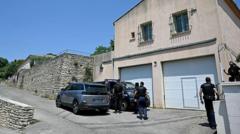In a landmark decision, Ryland Headley was sentenced to life imprisonment for a cold case dating back to 1967. The conviction stems from advanced forensic techniques that brought closure to the victim’s family decades after the brutal crime.
92-Year-Old Man Sentenced to Life for 1967 Rape and Murder: A Cold Case Solved

92-Year-Old Man Sentenced to Life for 1967 Rape and Murder: A Cold Case Solved
Ryland Headley, now 92, has been convicted for the 1967 murder and rape of Louisa Dunne, with justice delivered nearly six decades later through DNA evidence.
A British court has sentenced 92-year-old Ryland Headley to life in prison for the heinous rape and murder of 75-year-old Louisa Dunne in 1967. This case marks one of the oldest cold cases in Britain to reach resolution, as the jury found Headley guilty earlier this week. The crime remained unsolved for decades until a recent reopening of the investigation by Avon and Somerset Police in 2023.
In May 2024, detectives sent key items, including a blue skirt worn by Ms. Dunne at the time of the attack, for forensic re-examination, which led to a breakthrough. Advanced DNA evidence was matched to Headley, who had previously provided his DNA in 2012 following an unrelated legal incident. Additionally, a palm print collected from the crime scene corresponded with Headley’s fingerprint, which had been taken after his arrest.
The investigation had previously scanned over 19,000 male fingerprints and conducted approximately 1,300 interviews without identifying Headley, who lived outside the area at the time of the initial inquiry. In video footage from the police, Headley repeatedly responded “no comment” during questioning about Ms. Dunne's murder.
Notably, Headley had a criminal history related to violent offenses, including a life sentence for two counts of rape against elderly women in 1977. The details of his previous sentence indicate a pattern of targeting vulnerable individuals, but he was later released after serving part of his term.
Family members of Ms. Dunne expressed a mix of shock and relief upon hearing the news of the conviction. Mary Dainton, Ms. Dunne’s granddaughter, acknowledged her initial despair over the case's potential solubility, as the family had suffered considerably from the impact of the violence. She reflected on the profound anxiety that had overshadowed her mother’s life in the aftermath of the tragedy.
Experts note that the successful use of DNA technology highlights significant advancements in forensic science, allowing law enforcement to revisit cold cases and bringing long-delayed justice to victims' families. This historical resolution raises discussions about the legal implications and ethical considerations of prosecuting individuals in their late years for crimes committed decades prior.




















